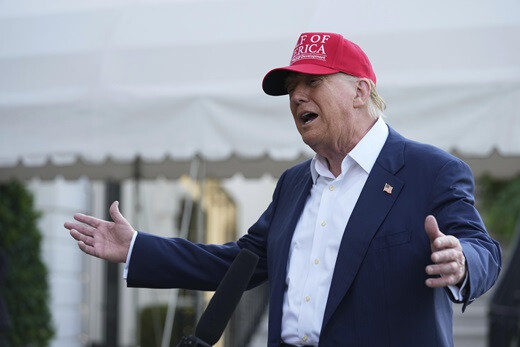
U.S. President Donald Trump began sending letters specifying "reciprocal tariffs" to 10 to 12 countries starting July 4 (local time), signaling that tariffs on these nations would be imposed on August 1. This move, coming four days before the reciprocal tariff grace period is set to expire on July 8, is interpreted as pressure to impose high tariffs of up to 70%. With South Korea likely to be among the recipients of these tariff letters, the government has launched an urgent response.
Returning to the White House after visiting Iowa, President Trump told reporters, "The range of tariffs specified in the letters will vary from 10-20% to 60-70%," adding, "The letters will be fully dispatched by the 9th, and tariff revenues will start flowing into the U.S. from August 1." This is seen as an attempt to quickly secure favorable agreements by imposing high tariffs on countries where trade negotiations have not progressed.
South Korea Faces Potential High Tariffs... Government Pushes for Tariff Grace Period Extension
The South Korean government is taking seriously the possibility of being included in President Trump's tariff letter recipients and is deliberating countermeasures. Yeo Han-koo, Trade Minister of the Ministry of Trade, Industry and Energy, was urgently dispatched to the U.S. on the evening of July 4 with the aim of negotiating for reciprocal tariff elimination. However, given the reality that a short-term negotiation settlement is difficult, there's an atmosphere of hoping for an extension of the tariff grace period for now.
Previously, in April, the Trump administration set a 25% reciprocal tariff rate for South Korea, raising concerns that an even higher tariff rate could be imposed if negotiations fail. U.S. Treasury Secretary Scott Bessent, in an interview with CNBC, warned, "Everyone (other countries) waits until the last minute because they think they can get a better deal," adding, "These countries need to be careful. Because their tariff rates could revert to the levels announced on April 2," implying the possibility of high tariffs on countries that are passive in negotiations.
U.S. Demands Broad Market Opening... South Korea Defends Sensitive Sectors Like Agriculture
The Ministry of Trade, Industry and Energy reported to the National Assembly on the same day that the U.S. is demanding from South Korea: △expanded market access for U.S. products in agriculture, services, and automobiles; △abolition of digital regulations on U.S. companies; △strengthened export controls aimed at China; and △increased investment by Korean companies in the U.S. and increased purchases of U.S. energy.
In response, the South Korean government reportedly informed the U.S. that it would exclude service market opening from the negotiations. Furthermore, while protecting sensitive agricultural sectors, it plans to propose measures to ease trade barriers along with expanded purchases of U.S. liquefied natural gas (LNG) and other energy sources. A high-ranking government official stated, "We are aiming to reduce tariffs or extend the grace period, but the situation is highly uncertain," while also indicating a cautious negotiation stance by saying, "We will not rush to conclude negotiations at the expense of substantive gains."
Trade Minister Yeo Han-koo is scheduled to hold trade negotiations with U.S. Trade Representative (USTR) Jamison Greer and others from July 5 to 6. In these negotiations, South Korea is expected to engage in intense diplomatic efforts to secure practical benefits under the threat of high tariffs.
[Copyright (c) Global Economic Times. All Rights Reserved.]






























